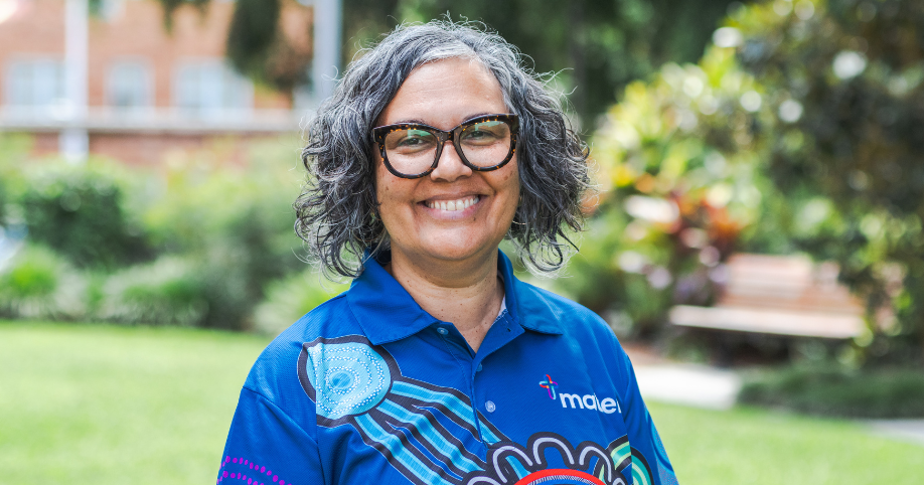
In April 2024, four Mater Researchers embarked on a journey from Australia to Canada to take part in a cross-cultural learning exchange with the aim to learn about how the Canadian health system works with First Nations peoples, and how a “culture first” approach is improving healthcare outcomes. During their time in Canada, the team visited an Indigenous birthing centre on the Six Nations Reserve, as well as First Nations Learning Lodge and the First Nations team at McMaster University.
The Mater Research team who travelled to Canada, included Davina Smith, a proud Gooreng Gooreng woman, Loretta Weatherall, a proud Gamilaraay woman, postdoctoral Research Officer Dr Luciana Massi and Principal Research Fellow in Indigenous Health Associate Professor Kym Rae.
Ms Smith, a Senior Indigenous Research Assistant in the Indigenous Health Research Group, returned from Canada inspired to take the learnings and implement them in her own work at Mater Research.
She said seeing firsthand the tangible benefits of a health system that respected and integrated First Nations culture at every level “just blew me away”.
“Their birthing on country facilities were incredible. Seeing firsthand how the representation of two lenses merged together to form integrated traditional cultural practices with Western medical practices was an incredible way of forming true reconciliation,” Ms Smith said.
At the Six Nations Birthing Hub, the team learnt about how First Nation culture, knowledge and practices were incorporated into all aspects of healthcare, including innovative ways that Indigenous women were able to give birth on their traditional land, with traditional land postcodes on birth certificates. Originally created by the community, for the community to create better health outcomes, their success has meant that they are now federally funded.
“One of the most truly remarkable ways they had done this was by turning RVs (recreation vehicles) into mobile birthing suites, allowing women to stay connected to their land and in their community during childbirth, surrounded by Indigenous midwives and supported by traditional practices,” Ms Smith said.
“It was a powerful affirmation of cultural identity and sovereignty."
A/Prof Rae said that the cultural learnings the team had in Canada were transformative.
“Their health system's deep integration of culture into practice is something we aspire to achieve here in Australia. Now more than ever, we need to ensure that Aboriginal and Torres Strait Islander health practitioners can train and work in environments that honour their cultural heritage,” A/Prof Rae said.
“I loved the cultural learnings that we had at every point we went to. Their culture is so deeply embedded in areas of health and universities, which are doing amazing things in terms of community outcomes. Their focus was on ‘culture first’. Spaces were welcoming with First Nations culture front and centre."
“I'd love to see our own health systems mirroring their amazing pathways for Indigenous people.”
In 2023, A/Prof Rae was awarded a $4.9 million grant to co-design a longitudinal study—the Stronger Families Study—to support Aboriginal and Torres Strait Islander families and their children for the first 1,000 to 2,000 days of life and identify health needs of their communities. As part of this, its Indigenous Steering Committee was formed in December 2023 and recently met to take control of the study design, with the aim that the research would be led by them and their community.
For A/Prof Rae, “flipping the script” and handing her research over to the Indigenous Steering Committee to lead the study has been daunting.
“All of our training as scientists is that you lead and design your own research. We’ve handed ours over and its being led by the Committee now. They are now the ones teaching us about how we can help. Not many people have ever done this, however I know this is the only way we can make a real, tangible difference,” A/Prof Rae said.
Reflecting on their learnings from Canada during National Reconciliation Week 2024, Ms Smith emphasised that reconciliation is a two-way process, and that reflecting on history and truth-telling is an essential part of the process.
“It's about coming together, owning our history, and working together on our strengths. The partnership between Indigenous and non-Indigenous Australians is crucial for achieving great outcomes in healthcare and beyond,” Ms Smith said.
“Aboriginal ways are about ‘knowing, being and doing’. You have to be led by what’s right for the relationship, which is led by heart knowledge, not so much head knowledge. Such an important process for reconciliation.”



